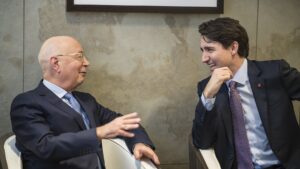Trudeau’s Resignation: What It Means for Canada and Beyond

In a dramatic turn of events, Canadian Prime Minister Justin Trudeau has announced his resignation, effective after the selection of his successor. This news arrives against the backdrop of escalating political tensions in Canada and the world, particularly with the United States set to certify a crucial vote for Donald Trump on the same day—January 6, 2025.
Our insiders at Extreme Investor Network had hinted that Trudeau’s position was hanging by a thread, particularly with a potential no-confidence vote looming in February. By resigning on January 6, Trudeau seems to aim at diverting public attention to U.S. politics while carefully repositioning himself. But the question remains: What does this mean for Canada’s political future and the global landscape?
The Grey Clouds of Political Uncertainty
The timing of Trudeau’s resignation is pivotal. It aligns with significant turning points suggested by analytical arrays dated December 27 and January 3, highlighting January 6 as critical with a Panic Cycle predicted for January 7. While some may see a coincidence, it’s hard to overlook the strategic calculation involved. Is Trudeau effectively trying to leverage political noise from the U.S. to shield himself from domestic scrutiny?
Moreover, Canada finds itself at a crossroads. This resignation signals not just a shift in leadership but raises concerns regarding the stability of the Liberal Party. With the financial markets always watching closely, our readers should note the potential volatility that could follow—both politically and economically.
The Road Ahead: Predictions for February
Experts at Extreme Investor Network are keeping an eye on the last two weeks of February. Notably, February 17 has been flagged alongside another crucial Panic Cycle on February 24. Could this be a period of unrest in Canadian politics, or even a precursor to broader global economic implications?
The withdrawal of established leadership often invites uncertainty—an environment where markets can react unpredictably. As past events in various countries have shown, the trajectory following a leadership change can lead to either a stabilizing effect or an increased risk of turmoil.
Global Context: Socialism and Its Consequences
As Canada speculates on its next steps, it’s imperative to reflect on the broader ideological battle shaping nations worldwide. Countries that have adopted socialist policies, as seen in Eastern Europe, Russia, China, and Latin America, often experience a decline in living standards, leading to an environment of unrest and dissatisfaction.
At Extreme Investor Network, we emphasize that while ideology plays a vital role in shaping economic outcomes, the practical consequences of policies on citizens’ livelihoods can create environments of struggle more than prosperity. When considering the implications of Trudeau’s resignation, we should ponder whether Canada will follow the pattern of nations where socialism has not yielded the promised results.
A Noteworthy Observation: Canada’s Unique Position
Canada serves as an interesting case study. As our economic analysts dissect the implications of Trudeau’s departure, we can’t help but notice how countries influenced by global players—such as Klaus Schwab—have often fallen into disarray. Schwab’s impact on countries should prompt Canadians to ask: what kind of leadership do we want, and where will it lead?
We at Extreme Investor Network are committed to delivering insightful, groundbreaking analysis to help you navigate these turbulent times. Our weekly updates will keep you abreast of developments related to Trudeau’s resignation and its implications for Canada and beyond.

Stay Tuned!
As we continue to monitor this evolving story, expect detailed reports that will provide deeper insights into how Canada plans to pivot post-resignation and what it means for its citizens. We promise to keep our community informed with the perspective that only Extreme Investor Network can provide.
In times of uncertainty, knowledge is power. We encourage you to stay connected with us as we delve deeper into the political and economic implications of this significant moment in Canadian history.

